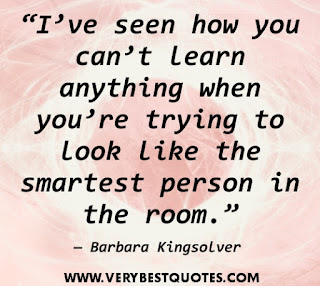Learning is my passion and I am completely and unapolegetically geeky about it. I know that it sometimes drives people crazy and yes, I do have trouble switching of but that's just me. I try to tame it a little but it always escapes! Even today, as I'm writing this, most of my friends are out at the beach as it's such a glorious summer's day. Where am I? Here, on my laptop, working and learning. Do I resent this, no.
It's Day 3 of our blog challenge @TeachThought and I'm extremely excited that this time the prompts have not come just from Beth and me, but also from our community. My final Masters research is around building a living online Community of Practice and I think we're getting somewhere with this.
The prompt today threw me into a bit of a spin really, which is my own fault as this is one of mine!! What was I thinking?? There are literally hundreds of things I want to work on in my teaching and learning. Where do I start? What's the most important? How do I prioritise? Woah!! Slow down and focus. I have such a bad habit of wanting to improve on everything or learn new things...yesterday. This is not good for one's health. At all. It can also mean that deep learning doesn't happen and this is what I'm arguing about in my research on teacher professional learning. We do too much in bits and pieces and move rapidly from one professional learning project to the next without really implementing concrete changes that can be sustained. Too often the learners can get lost in this process and by the 'learners', I mean the students AND the teachers.
This year I want to continue to explore more of Carol Dweck's and James Nottingham's work around Growth Mindset which will underpin my teaching and learning. Curriculum-wise, I want to really focus on developing the science curriculum in our school. Primary schools tend to not be very strong on Science and it's long been a concern that needs to be addressed urgently. I will work with the school, the community and, most importantly, the students, to develop a strong science learning focus that has all the cross-curricular links to make it relevant and linked to the world outside the classroom.
Carol Dweck discusses her research...
James Nottingham on the dangers of labelling our students...
My other focus area will be in leadership as I'm returning to school as a Deputy Principal, a role I've held before but so much has changed in what makes an effective and valuable leader and I want to push myself as far as I can go with this. I will learn from my previous role and the mistakes made and improve on the leader I was then to be the best I can be now. This is not only important for me but it's incredibly important for the school - the staff, students and community. I continue to have so much to learn. That's the fantastic part. I always return to Simon Sinek as one of my guides in this area. He speaks about the 'Why' of what we do and how important it is for everyone to be clear about this, particularly our leaders.


.JPG)



